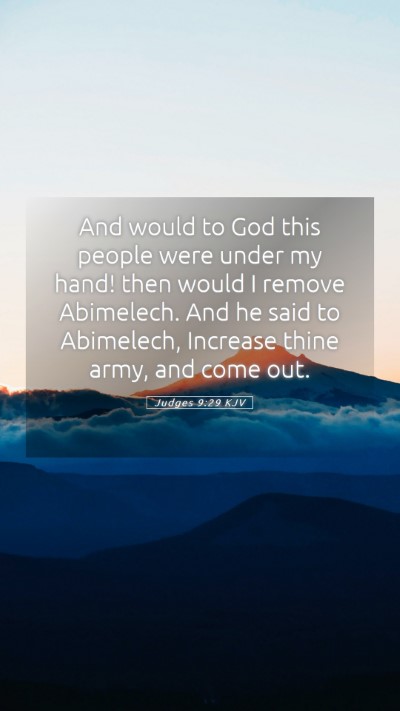Understanding Judges 9:29
Judges 9:29 states:
"Would that this people were under my hand! Then I would remove Abimelech." (Judges 9:29 ESV)
Overview
This verse expresses a desire for political power and control, particularly in the context of the events surrounding Abimelech's rise to power. To comprehend this scripture fully, we examine its historical background, thematic content, and theological implications using insights from reputable commentaries.
Historical Context
The Book of Judges describes a turbulent period in Israel's history, characterized by cycles of sin, oppression, repentance, and deliverance. Abimelech, son of Gideon, sought to establish himself as king, leading to strife and division among the Israelites. This desire for governance is pivotal in understanding the dynamics at play in Judges 9.
Meaning of the Verse
- Desire for Leadership: The phrase "Would that this people were under my hand!" indicates a yearning for authority. This reflects the broader human inclination toward leadership roles and the complexities that come with them.
- Context of Rebellion: Abimelech represents a character who seeks power through manipulation and violence, contrasting with the ideal king proposed by God. This verse serves as a reflection on the consequences of human governance devoid of divine guidance.
Biblical Commentary Insights
Various commentaries provide profound insights into this verse:
- Matthew Henry: He emphasizes the folly of seeking power without moral integrity and how the quest for dominion can lead to devastating consequences. Henry notes that Abimelech's ambition is a warning to all who seek authority for personal gain.
- Albert Barnes: Barnes interprets the verse as a piercing commentary on political greed and ambition. He presents the notion that such desires may stem from a sense of inadequacy or the desire to control rather than serve.
- Adam Clarke: Clarke highlights the importance of understanding the motivations behind leadership ambitions and how they can lead to disorder among the people, reinforcing the narrative structure within the Book of Judges about the need for righteous leadership.
Theological Implications
This verse raises significant theological questions, primarily concerning the nature of leadership and the heart's condition. It challenges readers to consider the qualities that define godly leadership versus self-serving ambition.
Application to Daily Life
For modern-day readers, Judges 9:29 serves as a reminder of the importance of seeking divine guidance in leadership roles, whether in personal, community, or organizational contexts. The following points provide practical takeaways:
- The Nature of Leadership: Understanding that true leadership involves service rather than coercion.
- Discernment in Ambition: Reflecting on the motivations behind one's ambitions and aligning them with God's will.
- Community and Governance: Recognizing the impact of leadership choices on the wider community and the importance of integrity in decision-making.
Cross References
- 1 Samuel 8:5-7 - The request for a king by Israel, illustrating the human desire for governance.
- Proverbs 29:2 - Wisdom regarding righteous leadership and its effects on a nation.
- Hebrews 13:17 - A New Testament perspective on the importance of spiritual leadership.
Conclusion
Judges 9:29 encapsulates themes of ambition, the nature of leadership, and the complexities of governance as portrayed in the Scriptures. By studying this verse, readers can digest significant insights about human behavior, authority, and the necessity for spiritual discernment in all areas of life.


